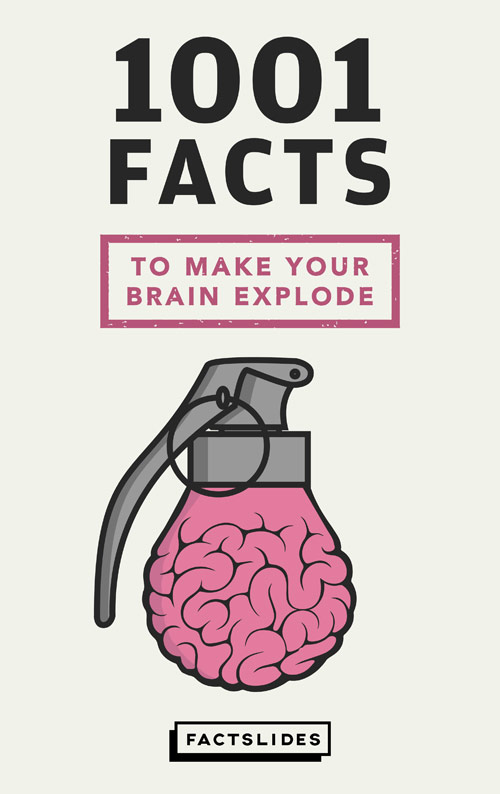The average ocean depth is 2.5 miles (4 km).
♦ SOURCE
♺ SHARE
14 billion pounds (6B Kg.) of garbage are dumped into the ocean every year. Most of it is plastic.
♦ SOURCE
♺ SHARE
If we could capture just 0.1% of the ocean's kinetic energy caused by tides, we could satisfy the current global energy demand 5 times over.
♦ SOURCE
♺ SHARE
29,000 rubber ducks were lost at sea in 1992, and are still being found, revolutionising our knowledge of ocean science.
♦ SOURCE
♺ SHARE
75% of the world's active and dormant volcanoes are in the Ring of Fire, an area in the basin of the Pacific Ocean.
♦ SOURCE
♺ SHARE
The Atlantic Ocean is big enough to let every person in the US have their own cubic kilometer in it.
♦ SOURCE
♺ SHARE
The world's oceans contain nearly 20 million tons of gold.
♦ SOURCE
♺ SHARE
In Newfoundland, Canada, the Atlantic Ocean sometimes freezes so people play hockey on it.
♦ SOURCE
♺ SHARE
At the ocean's deepest point, the water pressure is the equivalent of having 50 jumbo jets piled on top of you.
♦ SOURCE
♺ SHARE
70%
of the oxygen we breathe are produced by the oceans.
♦ SOURCE
♺ SHARE
Oceans cover 71% of the Earth's surface.
♦ SOURCE
♺ SHARE
95% of the underwater world remains unexplored.
♦ SOURCE
♺ SHARE
100% of the earth's ocean floor has been mapped to a maximum resolution of around 5km.
♦ SOURCE
♺ SHARE
The Bermuda Triangle has as many ship and plane disappearances as any other region of the ocean.
♦ SOURCE
♺ SHARE
The U.S. Army admitted it secretly dumped 64 million pounds of nerve and mustard gas agents into the ocean from 1944 to 1970, along with 400,000 chemical-filled bombs and more than 500 tons of radioactive waste.
♦ SOURCE
♺ SHARE
10,000 shipping containers are lost at sea each year and 10% of those hold toxic chemicals which may leak into the ocean.
♦ SOURCE
♺ SHARE
There's an ongoing decrease in the pH of the Earth's oceans: they are 30% more acidic than in 1751.
♦ SOURCE
♺ SHARE
It's okay to pee in the ocean since 95% of urine is water and the nitrogen in urea is used to feed ocean plants.
♦ SOURCE
♺ SHARE
A man called Harold Hackett has put over 4800 messages in bottles into the ocean and has gotten 3000 responses back.
♦ SOURCE
♺ SHARE
Before compasses, Vikings navigated the ocean using birds, whales, celestial bodies, chants and rhymes.
♦ SOURCE
♺ SHARE
In three decades, the world's oceans will contain more discarded plastic than fish when measured by weight, researchers say.
♦ SOURCE
♺ SHARE
Europe and Africa are only separated by 14.3 km (8.9 mi) of ocean and there are talks of creating the longest bridge ever.
♦ SOURCE
♺ SHARE
About 90% of the world's earthquakes occur along the Ring of Fire, an area in the basin of the Pacific Ocean.
♦ SOURCE
♺ SHARE
Jellyfish are the ocean's most efficient swimmers, consuming 48% less oxygen than any other swimming animal.
♦ SOURCE
♺ SHARE
Australia uses the motion of the ocean to generate zero-emission electricity and desalinate water simultaneously.
♦ SOURCE
♺ SHARE
There's up to US$60 billion in sunken treasure sitting at the bottom of the world's oceans.
♦ SOURCE
♺ SHARE
The world's largest underwater volcano, Tamu Massif, is the size of New Mexico.
♦ SOURCE
♺ SHARE
There's a "sea organ" built on the coast of Croatia that plays music like an organ when waves crash in and out of it.
♦ SOURCE
♺ SHARE
40% of the world oceans are heavily affected by human activities, including pollution, depleted fisheries, and loss of coastal habitats.
♦ SOURCE
♺ SHARE
There is a reservoir of water 3 times
the volume of all the oceans deep beneath the Earth's surface.
♦ SOURCE
♺ SHARE
An estimated 50-80% of all life on earth is found under the ocean surface and the oceans contain 99% of the living space on the planet.
♦ SOURCE
♺ SHARE
If the Earth had no atmosphere,
the oceans would evaporate.
♦ SOURCE
♺ SHARE



















